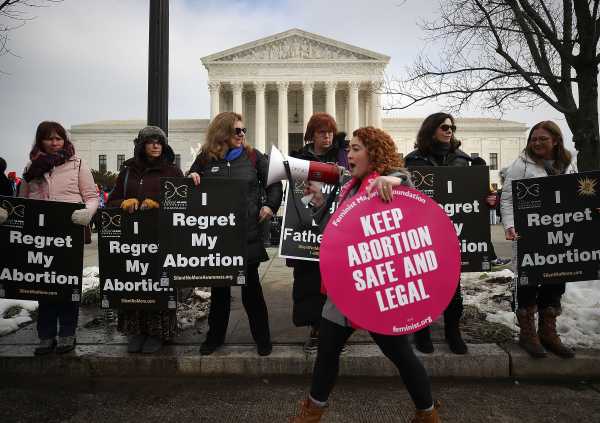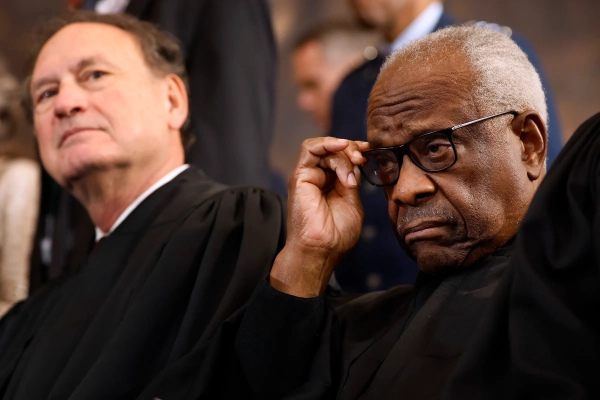
A federal judge temporarily blocked a Kentucky law that would effectively ban abortions in the state on Friday — the latest battle site in the right’s ongoing campaign to bring legislation to the Supreme Court that could challenge Roe v. Wade.
US District Judge David Hale, who was appointed by President Barack Obama in 2014, blocked Senate Bill 9, Kentucky’s “fetal heartbeat” bill banning abortions where fetal heartbeats are detected. Reproductive rights advocates argued in court that heartbeats can be detected as early as six weeks, before most women know they’re pregnant — meaning the law would, in essence, ban abortion in the state.
Hale’s restraining order stays the law, which Republican Gov. Matt Bevin signed with an “emergency” declaration to make it take effect immediately, for 14 days until he can hold a hearing on its constitutionality. He also blocked a second bill that banned abortions in cases where the mother discriminated against the fetus along the lines of gender, race, or disability.
The Senate bill passed Thursday, while the fetal discrimination bill passed Wednesday, and the ACLU of Kentucky quickly filed to stop them from going into effect. Anticipating the suit has a high “likelihood of success,” Hale awarded the temporary stay, citing a 1992 Supreme Court ruling that states may not prohibit women from terminating their pregnancies before viability, which is usually around 24 weeks.
Hale agreed that the bill would effectively ban abortion in the state and that those seeking abortions would, “would be immediately and irreparably harmed absent a temporary restraining order from the court.”
The bill’s proponents, including Bevin, who tweeted “Bring It!” to further challenges from the ACLU, remained optimistic about the eventual overturning of Roe v. Wade.
“I’m not operating on fear of the Supreme Court,” Republican Chris Fugate, who introduced the bill in the Kentucky House told the Courier Journal. “This bill is to save the life of the unborn who are crying out and saying, ‘I want to live,’ every time their heart pumps blood.”
But abortion rights advocates like Brigitte Amiri, deputy director of the ACLU’s Reproductive Freedom Project, say there’s a more sinister tactic at play in advancing an anti-abortion law that lawmakers know will likely be struck down: They want to eventually bring a case before the Supreme Court, where they hope the now-conservative majority bench led by President Donald Trump’s appointees Neil Gorsuch and Brett Kavanaugh will overturn America’s signature reproductive rights case.
“This onslaught of bans on abortion that fly in the face of Roe v. Wade are designed specifically for the purposes of trying to get the Supreme Court to reconsider Roe,” Amiri told the Associated Press.
Challenges to Roe v. Wade are cropping up nationwide
Last year, Vox’s Anna North reported on a different judge striking down a Mississippi law that would ban abortions at 15 weeks. But that bill’s fate hasn’t dissuaded other state legislators from passing even more restrictive laws, as Kentucky’s assembly demonstrated Thursday.
And Trump’s appointment of 91 federal judges has emboldened anti-abortion lawmakers to test similar laws around the country North notes, including:
- On March 19, legislators in Ohio introduced a bill that would ban abortion outright in the state. That bill has yet to come up for a vote, but on November 15, the Ohio House of Representatives passed a bill that would ban abortion after a fetal heartbeat can be detected — which can happen as early as six weeks. The bill now goes to the state Senate.
- In May, Gov. John Bel Edwards of Louisiana, a Democrat, signed a bill banning abortion after 15 weeks; it will only take effect if the Mississippi law is upheld, according to the Associated Press.
- A bill passed by the Iowa state legislature on May 2 and signed by Gov. Reynolds on May 4 requires patients seeking abortions to get an ultrasound. If the scan detects a fetal heartbeat, the patient is banned from getting an abortion, except in cases of rape, incest, a threat to the patient’s life, or severe fetal anomaly. Proponents of the bill say they hope it will make it to the Supreme Court and lead to the overturning of Roe.
- On March 27, the Kentucky House of Representatives passed a bill banning dilation and evacuation, a procedure often used in second-trimester abortions, if a patient is more than about 11 weeks pregnant. The bill, signed into law by Republican Gov. Matt Bevin in April, is facing a court challenge.
- Republican Gov. Eric Holcomb of Indiana signed a law on March 25 that will require doctors who treat patients for complications of abortion to proreport to the state those patients’ age, race, and county of residence, among other information. Critics of the law say it will stigmatize abortion, which has relatively low complication rates compared with other standard medical procedures, according to the Associated Press.
That’s prompted a strong pushback from reproductive rights groups on the ground, which continue to fight for access to abortion and other reproductive health care services.
In states like Georgia, where strict regulations and a scarcity of clinics make terminating a pregnancy difficult for many women, local groups have worked to normalize abortions and provide access. In Kentucky, which similarly has just one abortion clinic servicing the entire state, groups such as the Kentucky Health Justice Network raise funds to pay for out-of-state abortions. Clinic escorts also continue to guide those seeking abortions through crowds of protesters.
Kentucky’s lone abortion clinic, EMW Women’s Surgical Center reportedly had to turn away patients on Friday before Hale’s order was handed down. It remains open — for now.
Sourse: vox.com






